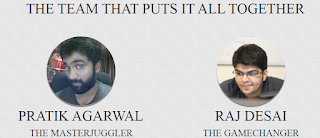At the NH7 Music Festival last year, the music flowed and the crowds rocked to it. When they took a break from all that grooving and went to get refreshments, little did they know, a freebie would be available to them – free Wi-Fi – and at a dustbin, at that! This was so people were encouraged to use that dustbin and not litter the venue.
 This bright spark of an idea belongs to Raj Desai and Pratik Agarwal – the Thinkscream duo. Thinkscream’s “aim is to ensure that people in India and around the world, have access to, and take advantage of all the available new age technology.” To ensure this happens, they built innovative products, like the TS Connect for Multiplexes and TS Connect for High Crowd Density events.
This bright spark of an idea belongs to Raj Desai and Pratik Agarwal – the Thinkscream duo. Thinkscream’s “aim is to ensure that people in India and around the world, have access to, and take advantage of all the available new age technology.” To ensure this happens, they built innovative products, like the TS Connect for Multiplexes and TS Connect for High Crowd Density events.The NH7 Music Festival was exactly the sort of “High Crowd Density event” that both of them love, to showcase their innovative use of technology. They seem to have hit the right spot with this idea because they were sponsored by MTS. Their other satisfied clients are: Cinemax, Red Bull, and Tata Teleservices among others.
Apart from Wi-Fi, they are into radio frequency identification technology (RFID) as well, since they want to “ensure that this near frequency communication technology helps upgrade various business verticals and solves a number of pain points.”
Raj told Networked India, “We have always been intrigued by human behaviour, and how we can effectively use basic incentives, to modify it a bit. When we wanted to set up Wi-Fi at Weekender (the NH7 event) with brandmovers and MTS, we wanted to provide something more than just vanilla Wi-Fi. That’s when we thought that incentivising people to keep their areas clean would be a good idea.”
Raj told Networked India, “We have always been intrigued by human behaviour, and how we can effectively use basic incentives, to modify it a bit. When we wanted to set up Wi-Fi at Weekender (the NH7 event) with brandmovers and MTS, we wanted to provide something more than just vanilla Wi-Fi. That’s when we thought that incentivising people to keep their areas clean would be a good idea.”
He admits that getting corporations on board is a big challenge. He says,
People in India are yet to realise how effective little modifications in process, systems, and their designs can be, to bring about large scale change.”
However, he has watched people respond positively to their ideas. He added, “Right from OrderOffWi-Fi for Cinemas to Wi-Fi at music festivals or the Wi-Fi trash bin; it feels amazing when people come and congratulate you for the idea, and more importantly use the product. In fact, we were amused when we saw people queuing up to use the Wi-Fi trash bin.”
He and Pratik are open to ideas and suggestions from others too. In fact, if people show up at their offices with beverages, food, music, and/or movies, they are more than welcome!
Written for Ericsson.


